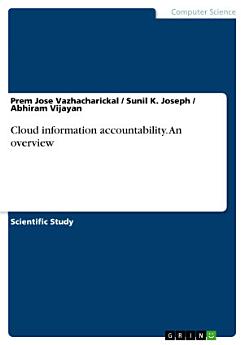Cloud information accountability. An overview
May 2017 · GRIN Verlag
Ebook
69
Pages
family_home
Eligible
info
reportRatings and reviews aren’t verified Learn More
About this ebook
Scientific Study from the year 2017 in the subject Computer Science - Applied, grade: 1,5, Mar Augusthinose College, language: English, abstract: Provable data possession (PDP) is a technique for ensuring the integrity of data in storage outsourcing. In this scheme, we address the construction of an efficient PDP scheme for distributed cloud storage to support the scalability of service and data migration, in which we consider the existence of multiple cloud service providers to cooperatively store and maintain the clients’ data. We present a cooperative PDP (CPDP) scheme based on homomorphic verifiable response and hash index hierarchy. We prove the security of our scheme based on multi-prover zero-knowledge proof system, which can satisfy completeness, knowledge soundness, and zero-knowledge properties. In addition, we articulate performance optimization mechanisms for our scheme, and in particular present an efficient method for selecting optimal parameter values to minimize the computation costs of clients and storage service providers. Our experiments show that our solution introduces lower computation and communication overheads in comparison with non-cooperative approaches. Using MR-PDP to store treplicas is computationally much more efficient than using a single-replica PDP scheme to store t separate, unrelated files (e.g., by encrypting each file separately prior to storing it). Another advantage of MR-PDP is that it can generate further replicas on demand, at little expense, when some of the existing replicas fail. The generation of replicas is on demand by the user’s request that is based on the security choice selected by the user at the time of file upload. The user can choose three options Low, Medium, High at the time of file upload. The uploaded file is divided in to N blocks of different sizes to achieve the efficiency in storage and is also used to improve security, here N represent the number of clouds we are using. Low means the file is divided into N blocks (here 3), and each block is stored in N different location of the single cloud. Medium means the file is divided into N blocks and each block is stored in N different clouds which improves the security of data but reduce the availability. High means the file is divided into N blocks and each N block is stored in N different clouds that are we are keeping the replicas of file in N different clouds. The system maintains a download count to dynamically create the replicas in accordance with the users demand.
About the author
Dr. Prem Jose Vazhacharickal is currently working as an assistant professor in the Department of Biotechnology, Mar Augusthinose College, Ramapuram, Kerala, India. He received the research training and academic guidance from Prof. Dr. Andreas Buerkert, University of Kassel, Germany.
Rate this ebook
Tell us what you think.
Reading information
Smartphones and tablets
Install the Google Play Books app for Android and iPad/iPhone. It syncs automatically with your account and allows you to read online or offline wherever you are.
Laptops and computers
You can listen to audiobooks purchased on Google Play using your computer's web browser.
eReaders and other devices
To read on e-ink devices like Kobo eReaders, you'll need to download a file and transfer it to your device. Follow the detailed Help Center instructions to transfer the files to supported eReaders.




